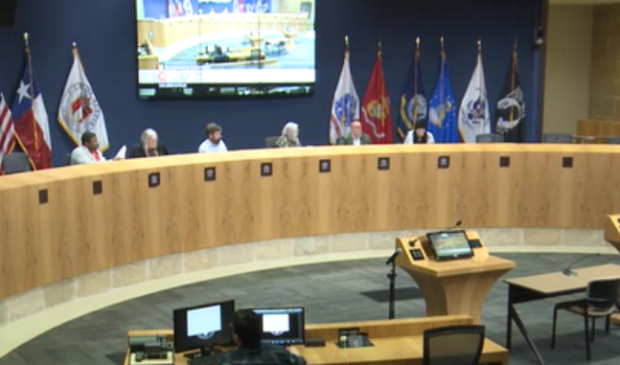Environmental Commission recommends city develop holistic resilience plan
Monday, March 9, 2020 by
Jessi Devenyns In many respects, Austin city officials are striving to create an environmentally sustainable city. However, according to the Environmental Commission, the city is not as resilient as it needs to be.
“Right now, we don’t have a resilience plan,” Commissioner Katie Coyne said at the March 4 meeting of the Environmental Commission. “I really just don’t want us to fall behind.”
A resilience plan is a policy framework designed to protect vulnerable communities from climate change and other physical, social and economic urban challenges.
Already, El Paso, Houston and Dallas have comprehensive, integrated plans. To explain to the commission how a resilience strategy is developed and the benefits of having such a framework for future city planning, El Paso’s chief resilience officer, Nicole Ferrini, described El Paso’s integrated strategy and the journey to its 2018 implementation.
According to Ferrini, creating and codifying a resilience plan is integral to building a city that has “the ability to survive, adapt and thrive in the face of whatever comes your way.” Resilience is more than preparing for the unexpected; it’s a framework for equitably addressing the economic, environmental and social consequences of environmental shocks and stressors.
Resilience differs from sustainability. Sustainability, Ferrini explained, is a micro-level approach that tackles individual systems and policies, while resilience takes a big-picture view and considers the context in which these systems are being implemented. At the same time, one cannot be successful without the other. “If you are not building sustainable systems … it’s pretty tough to be resilient in the face of whatever you’re facing,” said Ferrini.
Although Ferrini said each city’s resilience strategy is unique, she explained that the solutions cities develop to cope with disaster and change can be shared across Texas. These solutions can range from emergency response infrastructure to disaster funds like El Paso’s One Fund, a donation distribution system that was codified in the wake of the mass shooting last summer.
Austin’s particular challenge is determining how to continue to thrive in the face of economic success, according to Ferrini.
City Council has been working to answer this question. Last May, Council passed a resolution directing the city manager to analyze the climate resilience plans of peer cities and offer recommendations to craft one locally, including funding options.
Commissioner Coyne noted that since the passage of the resolution, there has been little forward momentum on the subject.
Similarly, the Office of Sustainability developed a Climate Resilience Action Plan for City Assets and Operations in 2018 that outlined strategies to increase resilience in the city.
Coyne told the Austin Monitor that the outlined strategies do not go far enough. “The document is basically an emergency response plan for city infrastructure. It does not include any non-city infrastructure or non-built systems including communities, social and economic components,” she explained.
Additionally, Coyne told the Monitor that in order for it to be successful in the long term, the approach needs to be taken by more departments than just the Office of Sustainability. Leadership all the way to the top have to be behind it.
Ferrini similarly told the commission that a successful resilience plan is integrated into a city’s strategic plan. This approach allows for resiliency to spread across departments and weave its way into departmental goals that are reported back to the city. “That’s the only way to do it,” she said.
To encourage Austin to more seriously look at developing a resilience plan, the commission pointed to the recent launch of the Global Resilient Cities Network by the Rockefeller Foundation, which is offering membership to 10 new cities in 2020. Commissioner Coyne said the foundation was amenable to working with the city of Austin.
The commission voted unanimously to recommend the development of a holistic resilience plan. Commissioners Andrew Creel, Mary Ann Neely, Wendy Gordon, Ryan Nill and Curtis Smith were absent.
Video still courtesy of ATXN.
The Austin Monitor’s work is made possible by donations from the community. Though our reporting covers donors from time to time, we are careful to keep business and editorial efforts separate while maintaining transparency. A complete list of donors is available here, and our code of ethics is explained here.
You're a community leader
And we’re honored you look to us for serious, in-depth news. You know a strong community needs local and dedicated watchdog reporting. We’re here for you and that won’t change. Now will you take the powerful next step and support our nonprofit news organization?











